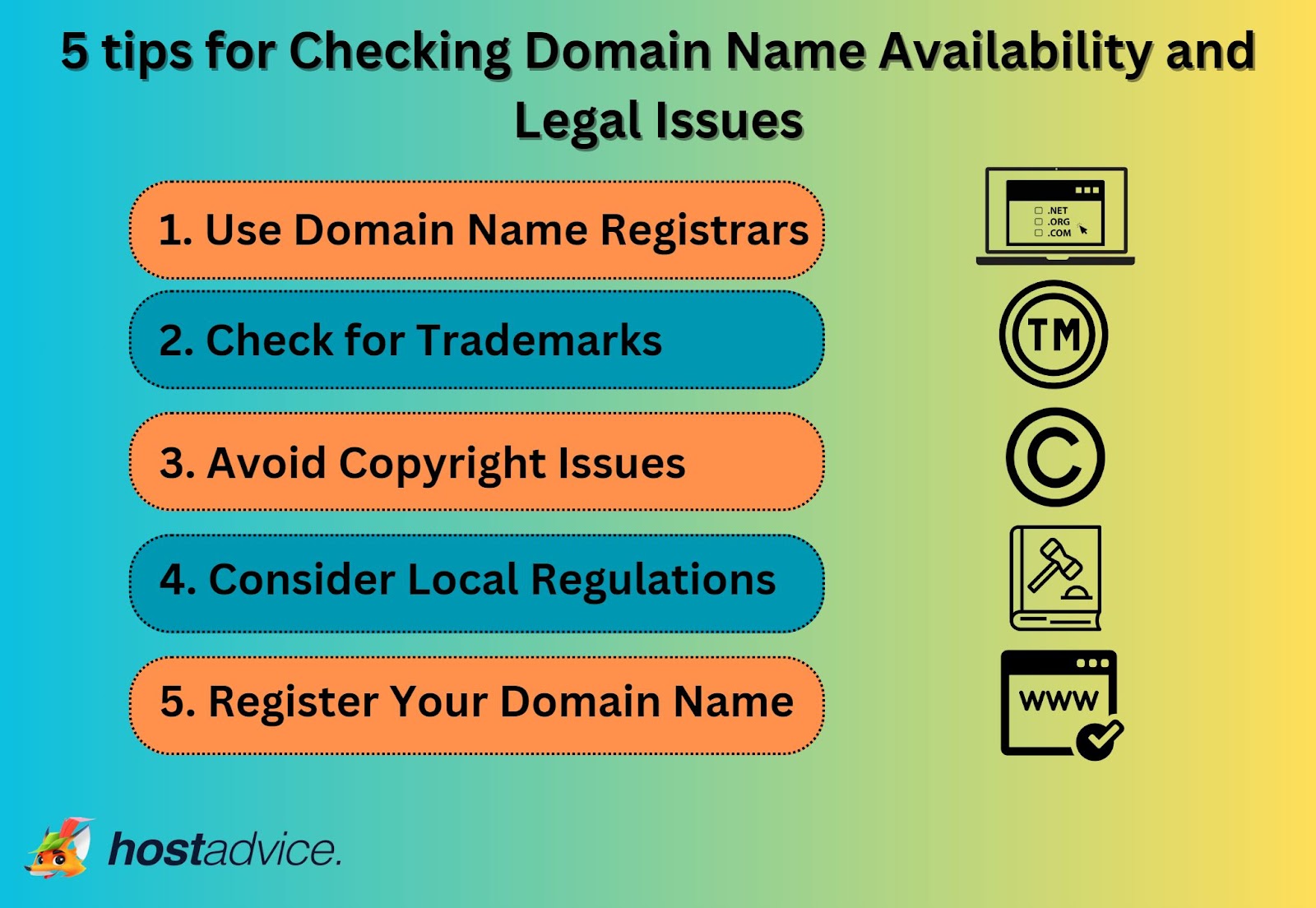
Your domain name is the first thing visitors see. It serves as your online identity, impacting your brand, search rankings, and overall perception. Choosing and buying a domain name is one of the most important decisions for the success of your website.
- Choose a domain name that aligns with your brand identity
- Keep it short, simple, and easy to remember
- Opt for a name that allows flexibility and won’t limit your future growth
In this article, we’ll explore the importance of selecting the perfect domain name and provide tips on how to choose.
- Understand your website’s purpose and target audience before selecting a domain name
- Brainstorm potential ideas using relevant keywords
- Keep your domain name simple, memorable, and easy to spell; ensure it is available and doesn’t infringe on any trademarks or copyrights
- Consider registering multiple domain extensions to protect your brand
- Compare pricing and features of reputable registrars
- A good domain name reflects your brand, resonates with your audience, and helps achieve website goals
- Choosing the right domain name is crucial for branding, SEO, and overall website success
Understand the Purpose of Your Website
Understanding the purpose of your website is crucial if you want to choose the right domain name for your brand and avoid the need to change your domain name later on.
This is because your website’s objective plays a significant role in determining the URL most suitable for your brand.
When choosing a domain name, there are a few things to consider, such as the following:
Identify Your Website’s Goals
To determine the primary purpose of your website, you need to identify your website’s goals. For instance, consider if you are creating a website to showcase your portfolio, sell products, or provide information.
Once you know your website’s objectives, you can choose a domain name that aligns with your aims. For example, if you’re creating a website to sell products, you might want to include the word “shop†or “store†in your domain name.
If you’re creating a website to showcase your portfolio, you can use your name or profession as your domain.
Define Your Target Audience
Consider the demographics, interests, and needs of your target audience. If your website caters to a specific niche, use a domain name that reflects that niche.
For instance, if your website is about fitness, you can include the word “fit†or “fitness†in your domain name. If your website is about cooking, you can include the word “cook†or “recipe†in the URL.
Here are some ways you can define your target audience:
- Research your competitors and determine their target audience
- Analyze your existing customer base
- Use web analytics tools to understand the behavior of visitors on your website
- Conduct surveys or polls to collect feedback from the people who already use your products/services
- Engage with customers on social media
Research Your Niche
When selecting a domain name, researching your niche and industry is an absolute must. To get started, identify relevant keywords and trends related to your website or business topic. This will help you come up with a unique and memorable domain name that stands out from the competition.
One of the best ways to research your industry is to look at what other businesses in the niche are doing. This can help you come up with ideas for your domain.
Determine Your Branding Strategy
To build a successful website, it’s crucial to determine your branding strategy, which includes choosing the right domain name. As the online address for your website, the domain name should reflect your brand and resonate with your target audience.
When selecting a domain name, consider using a brandable name or incorporating industry-related keywords. This will help make your URL more memorable and set you apart from the competition. You may also consider creating a logo and choosing colors that will create a consistent look and feel for your website.
Another important element of branding is your content strategy. This includes developing a unique style, tone, and personality to ensure your content stands out from the crowd. It’s also important to create SEO-optimized content that resonates with your target audience. With over 500 million blogs available on the internet, it’s essential to have a branding strategy that’ll set you apart from the rest.
Brainstorm Domain Name Ideas

Once you have identified the purpose of your website and your target audience, the next step is to brainstorm potential domain name ideas. This process involves generating creative names that align with your brand and appeal to your target audience.
Here are a few ways to come up with a unique web address:
Keyword Research
Conducting keyword research is a pivotal step in developing an SEO strategy for any website. It helps you identify popular and relevant search terms related to your niche or industry, which can then be used to craft content that will draw more organic traffic to the site. You can also use these keywords as inspiration to come up with a unique and memorable domain name that reflects your brand and appeals to your target audience.
- Google Keyword Planner is one of the most popular tools available for keyword research. It can help you generate a list of keywords closely related to your niche. It can also determine the average search volume for those terms.
- If you know about UberSuggest, you can also use it to create a list of keywords. It is a powerful keyword tool that helps you find long-tail keywords with high search volume and low competition.
- Ahrefs is another great option for keyword research. It provides detailed information and the competition level of different keywords. With this tool, you can easily identify which terms have the highest search volume and lowest competition.
Brandable Names
Creating a unique, memorable, and easy-to-pronounce brandable name is mandatory if you want to establish a strong brand identity. A good brandable name should be simple enough and easily remembered by your target audience. Additionally, it should be distinct from any existing brands in the market so that your visitors won’t mistake your brand for another.
To come up with a great brandable name, you should consider important factors, such as the uniqueness of the name, its pronunciation, and how it can be associated with your brand identity.
It’s also important to make sure that the name is not too long or complicated, as this could make it harder for your audience to remember.
As a final note, make sure to consider if the name has any negative associations, as this could negatively impact your brand’s reputation.
Fun Fact!
Yaro Starak is a successful blogger who has built his brand around the domain name Entrepreneurs-Journey.com.
However, despite his achievements, he has openly admitted that he wishes he had chosen a better name for his website. In fact, during his private coaching program, he has frequently emphasized how important it is to have a strong and memorable domain name to maximize branding, reach, and traffic.
If he had invested in a better domain name earlier, he could have potentially gained 10% more traffic and branding for his site. If we calculate this quantitatively, that percentage equates to $100,000 in value.
Use Domain Name Generators
One way to come up with domain name ideas is to use domain or business name generators. These tools can provide you with a range of options based on your niche, industry, or keywords. They can also suggest variations of words that you may not have thought of yourself.
This can be a great way to brainstorm creative domain name possibilities.
It’s important to double-check the availability of your potential domains by using a WHOIS lookup tool or with the respective registrar for top-level domains. Some generators even have this feature built-in, so you don’t have to go through the extra step.
You should also verify that the domain name you choose is in line with your brand, message, and vision.
Once you’ve found a domain that checks all the boxes, you must register it as quickly as possible, so no one else can snatch it up!
Keep It Simple and Memorable
Having a memorable domain name is crucial for building a successful online presence. According to Shopify, websites with top-level domains (TLDs) are over 33% more memorable than those with other TLDs. This means that having a .com, .net, or .org can significantly impact how easily people can remember your website.
When customers can easily recall your domain name, they’re more likely to return to your site and recommend it to their friends and family
- Avoid words or phrases that are too long, as they may be difficult for users to remember
- Avoid using numbers or hyphens, as they may confuse or frustrate your visitors.
Having a domain name that is memorable and easy to spell will improve the user experience of your website and make it easier for people to find you online.
Here are a few examples of simple memorable domain names:
- Pixabay.com
- Freepix.com
- Supercook.com
What makes them unique? They’re easy to spell, don’t contain any numbers or hyphens, and convey a meaning relevant to the service provided.
Consider Localizing Your Domain Name
If you are targeting a specific geographic location, consider using a local domain extension. For example, you can use .uk for the United Kingdom, .ca for Canada, or .au for Australia.
Using a local domain name can help you establish a local presence and improve your search rankings within that region. It also provides more clarity to users, as they know exactly where you are located.
However, remember that you may need to register multiple domain names if you plan on targeting multiple countries or regions.
Check Domain Name Availability and Legal Issues

It’s important to check the availability of your selected domain name before finalizing your choice. It’s also a good idea to check for variations to ensure that there aren’t any similar names that your visitors could confuse your brand with.
Here are some ways you can check the availability and legal criteria of your domain name:
Use Domain Name Registrars
Domain registrars, such as GoDaddy, Namecheap, or Domain.com, are essential in knowing whether a domain name is available to purchase. These services help check the availability of your chosen domain name and explain how you can acquire available domains.
If the domain is taken, the registrar will offer suggestions that match your original search term and are more suitable and available to purchase.
It’s important to remember that when you purchase a domain name, you are not only buying the right to use that exact phrase as an address for your website but also protecting it from anyone else trying to purchase it. Therefore, it is highly recommended that after finding the perfect domain name, you must act quickly and make sure to purchase it immediately.
Check for Trademarks
Another important step when selecting a domain name is to ensure it does not infringe on anyone else’s intellectual property. Before you purchase the domain, be sure to check if the same or similar phrase has already been trademarked.
The US Patent and Trademark Office (USPTO) and the World Intellectual Property Organization (WIPO) are two great resources for searching existing trademarks. The USPTO offers a free Trademark Electronic Search System (TESS), which allows you to check trademarks and pending applications in the United States Patent and Trademark Office database.
The WIPO also provides trademark databases where you can search for existing trademarks from different countries worldwide. It’s important to remember that even if a trademark is not registered, it is still possible for someone to have rights to it; therefore, it should be avoided when selecting your domain name.
Here are a few types of trademarks to be aware of when selecting a domain name:
- Word Marks – This type of trademark is a word or phrase, such as “Amazon†or “McDonald’sâ€
- Logo Marks – These are visual symbols, like the Nike Swoosh or Apple logo
- Service Marks – A service mark is a trademark for services, such as “FedEx†or “DHLâ€
- Sound Marks – This type of trademark is a unique sound that can be associated with a brand, like the NBC chimes
Avoid Copyright Issues
Once you register your domain name and have ensured that it is not infringing on any existing trademarks, the next step is to ensure it does not violate any copyright laws. Copyrighted terms, logos, or brands should not be used in your domain name, as this could land you in legal trouble.
You must also check if the phrase or words used in your domain name already appear in a book, movie, television show, or other work that may be copyrighted. If it does, you should avoid using that phrase for your domain name entirely.
A few examples of copyrighted words are names of celebrities, characters from movies and books, or popular phrases. It’s also important to avoid using words that have been trademarked by another company, even if the terms are spelled differently or used in a different context.
Consider Local Regulations
You must also consider local regulations that may impact your domain name. Different countries may have specific rules and regulations that you need to be aware of before registering a domain.
It’s important to do the necessary research and ensure that your desired domain name complies with all the local regulations.
Register Your Domain Name
As soon as you have found an available domain name that meets all of your requirements and has no legal issues associated with it, register it immediately. Don’t wait too long, as someone else might purchase the rights to use that exact phrase as an address for their website.
When registering a domain name, read all the terms and conditions before you agree to anything. This will ensure that you understand the rules associated with owning a domain name, such as expiration dates, renewal fees, and others.
Evaluate Your Options and Make a Decision

After brainstorming domain name ideas and verifying their availability and legal issues, it’s time to evaluate your options and make a final decision. Here are some factors to consider when selecting the best domain name for your website:
Choose the Right Top-Level Domain (TLD)
Choosing the appropriate TLD for your website is crucial. However, you need to understand a TLD first. TLD is the highest domain name level in the hierarchical Domain Name System (DNS).
While .com, .org, and .net are the most common TLDs, many other options are available. Consider which TLD is best suited for your website and target audience. For example, .edu is intended for educational institutions, while .gov is reserved for government organizations.
Keep It Short and Simple
Shorter domain names are typically easier to remember and type, making them more convenient for users. You should ideally aim for a domain name between 6-14 characters. You must also avoid using long or complex words that are difficult to spell or remember.
Make It Easy to Pronounce and Spell
Choose a domain name that is easy to pronounce and spell. A simple and easy-to-remember domain name will make it easier for people to find your website. Therefore, avoid using numbers, hyphens, or unusual spellings that can confuse your audience.
Reflect Your Brand or Business
Your domain name should reflect your brand or business. Choose a name that is relevant to your products or services.
It will help users remember your brand and make it easier for them to find you online. Consider incorporating your brand name or a relevant keyword in your domain name.
Think About SEO
Your domain name can also affect your search engine ranking. Therefore, choosing a name that includes relevant keywords related to your business or industry is best. An SEO-friendly domain name will help your website appear higher in search engine results pages (SERPs).
Additionally, it’s also crucial to speed up your website. Google’s algorithms factor in website speed when determining how relevant and user-friendly a site is.
Besides, research suggests that the top-ranking website is 10 times more likely to attract clicks compared to a page in the tenth position. So why not aim for the best? With such a significant difference in click-through rates, it’s an absolute must to implement quality SEO.
Conclusion
A wise choice in a domain name could be the difference between success and failure for your website. Investing your time and resources into choosing a unique domain name that accurately reflects your business is essential to successfully connecting with your target audience.
Before you choose a domain name, it’s important to check out good web hosting services and consider whether it’s worth paying more for a top-level domain. A top-level domain can help your website get seen by more people, but it also comes with extra costs.
So, take your time, do some research, and select a domain name right for you so that you can make your mark in this rapidly growing digital market! Explore the best website builders available today!
Next Steps: What Now?
- Learn how to buy a domain name
- What is a Top-Level Domain?
- What is a Domain Name?
- A Guide to Domain Name System
- Exploring AI Focused Domains
Learn More About Buying Domain Names
- How to Buy a Domain Name that Is Taken in 7 Steps (+ Pro Tips)
- How To Buy Expired Domains and Make Profit
- How to Buy a Domain Name Forever: Is It Possible?
- How Much Does a Domain Name Cost? (& How To Lower The Price)
- How to Check If a Domain Is Available (& 13 Best Domain Name Search Tools)
- How to Choose a Domain Name That Is Right for Your Website
- How to Find a Domain Name Owner with WHOIS Lookup Tool
- How to Price a Domain: From Cost to Profit
- Buying Domain Name from GoDaddy: Step-by-Step Guide
- Buying a Cheap Domain Name: Where & How to Buy One
- I Bought a Domain, Now What? 9 Steps to Take After Purchasing a Domain Name
- How to Renew Domain Name: What to Do When Domain Registration Expires
- WordPress Domain Price: The Ultimate 2024 Cost Guide







